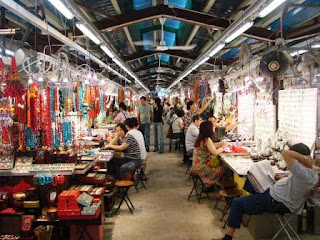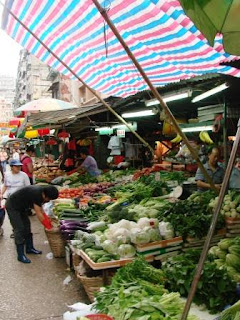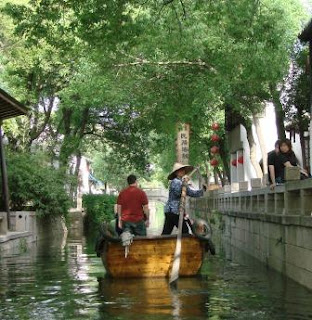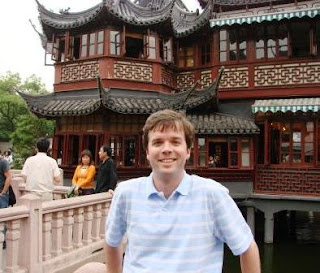


Today I left the group behind to have a day to myself. I started with a visit to Sam’s, a world famous tailor who has dressed every sitting president since Nixon. Of course I had to pick up a couple of shirts. I then hopped a cab over to the Jade Market. That was quite an experience. Rows and  rows of vendors peddling trinkets of all kinds. There were a few items I had left on my list. While there I happened upon a typical Chinese open air market. I am fascinated with these markets. Rows and rows of exotic foods of all kinds – fresh meat dangling in the open air. Seafood so fresh that the clams spit at you. I then stopped in a Pizza Hutt for lunch. Brian and Lizzy showed me a good time last night so I needed a slice of pizza and a sweet tea. That hit the spot. Then, it was off to Cheng’s for my final fitting. Francis and Cindy Cheng have been fitting customers with hand made suits and shirts for 39 years. They have connections with IBM in RTP which is how we all found out about them. My suit and tux fit me like a glove. At these prices with this quality and custom fit, I’m done with off the rack clothing. Move over Brooks Brothers.
rows of vendors peddling trinkets of all kinds. There were a few items I had left on my list. While there I happened upon a typical Chinese open air market. I am fascinated with these markets. Rows and rows of exotic foods of all kinds – fresh meat dangling in the open air. Seafood so fresh that the clams spit at you. I then stopped in a Pizza Hutt for lunch. Brian and Lizzy showed me a good time last night so I needed a slice of pizza and a sweet tea. That hit the spot. Then, it was off to Cheng’s for my final fitting. Francis and Cindy Cheng have been fitting customers with hand made suits and shirts for 39 years. They have connections with IBM in RTP which is how we all found out about them. My suit and tux fit me like a glove. At these prices with this quality and custom fit, I’m done with off the rack clothing. Move over Brooks Brothers.
 Tomorrow we leave for the United States. Last night, we gathered together to say our final goodbyes and assess the course from our own perspectives. As I said last night, this has been a life changing experience for me. I recounted Ashley’s comment to me the morning she and the kids drove me to the airport. As we wound down Glenwood Avenue passing by manicured lawn after manicured lawn, she said: “Do you realize that you are actually going to cities far more sophisticated than the one we live in right now?” How true. What has amazed me most in this experience is just how sophisticated and cosmopolitan the urban areas of China actually are. The pace of culture and business in Beijing, Shanghai and Hong Kong is fast and furious. They are confident and charging forward. There is no stopping this transformation going on right in front of our eyes. This is what we have seen, smelled, touched and heard over the last two weeks.
Tomorrow we leave for the United States. Last night, we gathered together to say our final goodbyes and assess the course from our own perspectives. As I said last night, this has been a life changing experience for me. I recounted Ashley’s comment to me the morning she and the kids drove me to the airport. As we wound down Glenwood Avenue passing by manicured lawn after manicured lawn, she said: “Do you realize that you are actually going to cities far more sophisticated than the one we live in right now?” How true. What has amazed me most in this experience is just how sophisticated and cosmopolitan the urban areas of China actually are. The pace of culture and business in Beijing, Shanghai and Hong Kong is fast and furious. They are confident and charging forward. There is no stopping this transformation going on right in front of our eyes. This is what we have seen, smelled, touched and heard over the last two weeks.
Honestly, each and every MBA should want to experience what I have just experienced. It has had a profound effect on me. My view of this world has changed entirely. During my childhood I watched the fall of communism. Ella Reaves, Harry and Fletcher will watch the rise of China.
 rows of vendors peddling trinkets of all kinds. There were a few items I had left on my list. While there I happened upon a typical Chinese open air market. I am fascinated with these markets. Rows and rows of exotic foods of all kinds – fresh meat dangling in the open air. Seafood so fresh that the clams spit at you. I then stopped in a Pizza Hutt for lunch. Brian and Lizzy showed me a good time last night so I needed a slice of pizza and a sweet tea. That hit the spot. Then, it was off to Cheng’s for my final fitting. Francis and Cindy Cheng have been fitting customers with hand made suits and shirts for 39 years. They have connections with IBM in RTP which is how we all found out about them. My suit and tux fit me like a glove. At these prices with this quality and custom fit, I’m done with off the rack clothing. Move over Brooks Brothers.
rows of vendors peddling trinkets of all kinds. There were a few items I had left on my list. While there I happened upon a typical Chinese open air market. I am fascinated with these markets. Rows and rows of exotic foods of all kinds – fresh meat dangling in the open air. Seafood so fresh that the clams spit at you. I then stopped in a Pizza Hutt for lunch. Brian and Lizzy showed me a good time last night so I needed a slice of pizza and a sweet tea. That hit the spot. Then, it was off to Cheng’s for my final fitting. Francis and Cindy Cheng have been fitting customers with hand made suits and shirts for 39 years. They have connections with IBM in RTP which is how we all found out about them. My suit and tux fit me like a glove. At these prices with this quality and custom fit, I’m done with off the rack clothing. Move over Brooks Brothers. Tomorrow we leave for the United States. Last night, we gathered together to say our final goodbyes and assess the course from our own perspectives. As I said last night, this has been a life changing experience for me. I recounted Ashley’s comment to me the morning she and the kids drove me to the airport. As we wound down Glenwood Avenue passing by manicured lawn after manicured lawn, she said: “Do you realize that you are actually going to cities far more sophisticated than the one we live in right now?” How true. What has amazed me most in this experience is just how sophisticated and cosmopolitan the urban areas of China actually are. The pace of culture and business in Beijing, Shanghai and Hong Kong is fast and furious. They are confident and charging forward. There is no stopping this transformation going on right in front of our eyes. This is what we have seen, smelled, touched and heard over the last two weeks.
Tomorrow we leave for the United States. Last night, we gathered together to say our final goodbyes and assess the course from our own perspectives. As I said last night, this has been a life changing experience for me. I recounted Ashley’s comment to me the morning she and the kids drove me to the airport. As we wound down Glenwood Avenue passing by manicured lawn after manicured lawn, she said: “Do you realize that you are actually going to cities far more sophisticated than the one we live in right now?” How true. What has amazed me most in this experience is just how sophisticated and cosmopolitan the urban areas of China actually are. The pace of culture and business in Beijing, Shanghai and Hong Kong is fast and furious. They are confident and charging forward. There is no stopping this transformation going on right in front of our eyes. This is what we have seen, smelled, touched and heard over the last two weeks.Honestly, each and every MBA should want to experience what I have just experienced. It has had a profound effect on me. My view of this world has changed entirely. During my childhood I watched the fall of communism. Ella Reaves, Harry and Fletcher will watch the rise of China.












































